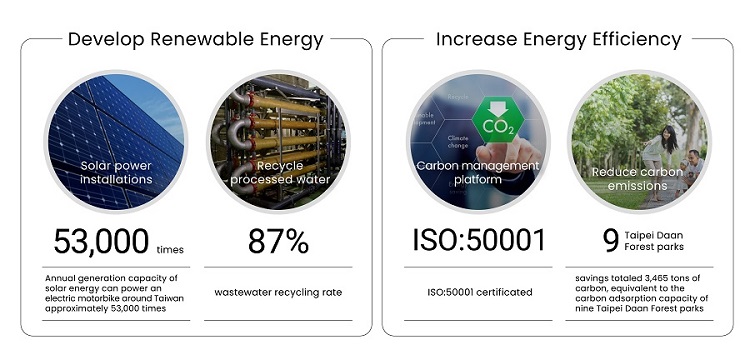Category
Blog
2022.07.25
Blog
A two-pronged approach to sustainable development
Energy management is a crucial part of addressing global climate change. By actively adopting renewable energy use along with improved energy efficiency, we can mitigate the effects of global warming while lowering our dependence on fossil fuels to achieve sustainable growth.
Setting targets
In order to accelerate the pace of energy savings and carbon reduction, United Nations organizations and many governments have set emission reduction targets. At BenQ Materials, we have set a target of reducing carbon emissions by 30% by 2030 (vs. 2020), and to achieve net zero emissions by 2050.
We have put various improvement plans in motion for both the development of renewable energy and energy efficiency. Our targets are purposely set to be more stringent than those stipulated by the Taiwanese government. With high standards and a systematic energy management mechanism in place, we aim to be a leading company for corporate energy conservation and environmental protection.

More renewables
The use of renewable energy not only minimizes damage to the environment, but also increases the energy autonomy rate. In our various facilities, we continue to increase the proportion of green energy used. We have been building solar power installations at each of our plants, having reached an annual generation capacity of 1.38 million kilowatt hours in 2021. That’s enough to power an electric motorbike around Taiwan approximately 53,000 times.
In addition, we have continued to enhance the recycling capacity of processed water, promoted water conservation measures, and have achieved an 87% wastewater recycling rate.
Better efficiency
Beyond renewable energy usage, we also monitor energy flow and evaluate potential improvements through a comprehensive monitoring system. A carbon management platform was established in 2021 for calculating and monitoring carbon emissions in a timely manner. This provides insights into the sources of carbon emissions for making improvements.
In natural gas management, for example, we are actively developing low-carbon products and identifying energy-consuming nodes in processes through better monitoring and improvements, resulting in reduced use of natural gas.
In terms of electricity management, from 2012 to 2021, our savings totaled 3,465 tons of carbon emissions thanks to the implementation of electricity saving measures. This tally is equivalent to the carbon adsorption capacity of nine Taipei Daan Forest parks.
ISO 50001
Our proactive efforts in building, monitoring and implementing an energy management system received ISO 50001 energy management certification in December 2021. In meeting international certification standards, our comprehensive management measures in reducing energy consumption and controlling energy costs have been confirmed. It also demonstrates the company's ability to operate in a sustainable manner.
As an inescapable global issue, climate change requires proactive energy management and carbon reduction measures to mitigate further environmental damage. BenQ Materials will continue pressing forward its green agenda of increasing the use of renewables, improving energy efficiency, and reducing greenhouse gas emissions at all its factories to achieve its emissions targets and contribute to the sustainable development of the environment.
Setting targets
In order to accelerate the pace of energy savings and carbon reduction, United Nations organizations and many governments have set emission reduction targets. At BenQ Materials, we have set a target of reducing carbon emissions by 30% by 2030 (vs. 2020), and to achieve net zero emissions by 2050.
We have put various improvement plans in motion for both the development of renewable energy and energy efficiency. Our targets are purposely set to be more stringent than those stipulated by the Taiwanese government. With high standards and a systematic energy management mechanism in place, we aim to be a leading company for corporate energy conservation and environmental protection.

More renewables
The use of renewable energy not only minimizes damage to the environment, but also increases the energy autonomy rate. In our various facilities, we continue to increase the proportion of green energy used. We have been building solar power installations at each of our plants, having reached an annual generation capacity of 1.38 million kilowatt hours in 2021. That’s enough to power an electric motorbike around Taiwan approximately 53,000 times.
In addition, we have continued to enhance the recycling capacity of processed water, promoted water conservation measures, and have achieved an 87% wastewater recycling rate.
Better efficiency
Beyond renewable energy usage, we also monitor energy flow and evaluate potential improvements through a comprehensive monitoring system. A carbon management platform was established in 2021 for calculating and monitoring carbon emissions in a timely manner. This provides insights into the sources of carbon emissions for making improvements.
In natural gas management, for example, we are actively developing low-carbon products and identifying energy-consuming nodes in processes through better monitoring and improvements, resulting in reduced use of natural gas.
In terms of electricity management, from 2012 to 2021, our savings totaled 3,465 tons of carbon emissions thanks to the implementation of electricity saving measures. This tally is equivalent to the carbon adsorption capacity of nine Taipei Daan Forest parks.
ISO 50001
Our proactive efforts in building, monitoring and implementing an energy management system received ISO 50001 energy management certification in December 2021. In meeting international certification standards, our comprehensive management measures in reducing energy consumption and controlling energy costs have been confirmed. It also demonstrates the company's ability to operate in a sustainable manner.
As an inescapable global issue, climate change requires proactive energy management and carbon reduction measures to mitigate further environmental damage. BenQ Materials will continue pressing forward its green agenda of increasing the use of renewables, improving energy efficiency, and reducing greenhouse gas emissions at all its factories to achieve its emissions targets and contribute to the sustainable development of the environment.



